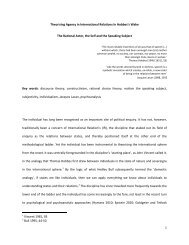Issue 14, May - June 2013 - The University of Sydney
Issue 14, May - June 2013 - The University of Sydney
Issue 14, May - June 2013 - The University of Sydney
Create successful ePaper yourself
Turn your PDF publications into a flip-book with our unique Google optimized e-Paper software.
From Protest to Justice?<br />
Hosted by UTS:Speaks<br />
Protest and reform movements across the globe emerge in response to global crises – financial collapse, climate<br />
change, hunger, war, human rights violations and others. Since the 1990s many movements have forged a new<br />
coherence, as a ‘global justice movement’. Often viewed as a threat to the status quo by powerful interests, the<br />
movement meets with divisive, sometimes crushing and even cunning repression.<br />
Drawing on fascinating new research and compelling case studies, this public lecture explores the ideas <strong>of</strong> the global<br />
justice movement. It surveys the very coherent values that underpin the movement and the alternatives it <strong>of</strong>fers. It<br />
looks at the dramatic failure <strong>of</strong> global institutions to deal with crises that devastate the quality <strong>of</strong> lives. And it considers<br />
a future alternative to the straining paradigm <strong>of</strong> market globalism – justice globalism.<br />
PANELLISTS:<br />
• Associate Pr<strong>of</strong>essor James Goodman, <strong>University</strong> <strong>of</strong> Technology, <strong>Sydney</strong><br />
• Pr<strong>of</strong>essor Manfred Steger, <strong>University</strong> <strong>of</strong> Hawaii and RMIT <strong>University</strong><br />
Manfred Steger and James Goodman are co-authors with Erin Wilson <strong>of</strong> Justice Globalism: Ideology, Crises, Policy<br />
(Sage, London, March <strong>2013</strong>), described by Saskia Sassen as a ‘brilliant systematic and empirically based analysis’.<br />
Copies <strong>of</strong> the book will be available at the lecture.<br />
When: Wednesday 29 <strong>May</strong> <strong>2013</strong>, 6 - 8pm<br />
Where: <strong>The</strong> Great Hall, Level 5, UTS Tower Building, Broadway, <strong>Sydney</strong><br />
Cost: Free (RSVP Required)<br />
RSVP: http://newsroom.uts.edu.au/events/<strong>2013</strong>/05/from-protest-to-justice-0<br />
Wednesday 29 <strong>May</strong> <strong>2013</strong><br />
IDHR Lunchtime Seminar Series<br />
<strong>University</strong> <strong>of</strong> <strong>Sydney</strong><br />
Beppe Grillo Goes to Rome – An Analysis <strong>of</strong> the Rise and Futures <strong>of</strong> the Most Unlikely Winner <strong>of</strong> Italy’s<br />
<strong>2013</strong> General Election<br />
Dr. Giovanni Navarria, <strong>University</strong> <strong>of</strong> <strong>Sydney</strong><br />
A general election always <strong>of</strong>fers an important opportunity for checking the democratic pulse<br />
<strong>of</strong> a country. Italy’s <strong>2013</strong> election was no exception. With no clear ruling majority in the<br />
Parliament, there was a most unlikely winner: the 5 Star Movement, a citizens’ platform led<br />
by Beppe Grillo, the controversial, charismatic comedian-turned-blogger-turned-politicalguru.<br />
Before the election, the pollsters had estimated the Movement could get anything<br />
between 15 and 18 per cent <strong>of</strong> the votes. But Grillo’s Movement went way beyond any<br />
forecasts by pollsters. It managed the impossible for a first-timer: with over 25 per cent, it<br />
became almost overnight the major single political force in the country.<br />
In this seminar, Dr Navarria explains the reasons why this happened and what Grillo’s<br />
success may signify for the future <strong>of</strong> democracy in Italy, a country that is facing both an<br />
escalating crisis and stubborn refusals within the political class to initiate credible reforms<br />
<strong>of</strong> the political system. Ultimately, Dr Navarria argues, the Five-Star Movement’s success represents a wake-up call<br />
for Italy’s democracy: it embodies both the positive and negative aspects <strong>of</strong> the crisis the country is undergoing.<br />
Giovanni’s research interests include the relationship between authoritarian regimes in Asia and the language and<br />
tactics <strong>of</strong> democracy; the role new communication media have in politics; the meaning <strong>of</strong> representation and the<br />
role <strong>of</strong> civil society in contemporary democracies. He is currently working on a project focusing on the effects<br />
communication media have on prevailing power-dynamics between state and citizens in the authoritarian regimes <strong>of</strong><br />
the Asia-Pacific region. He is also completing a book exploring the changing meanings <strong>of</strong> power and civic engagement<br />
in technologically advanced societies.<br />
When: 12:30 - 2pm<br />
Where: RC Mills Boardroom, <strong>14</strong>8, Level 1, RC Mills Building, <strong>University</strong> <strong>of</strong> <strong>Sydney</strong><br />
RSVP: idhr@sydney.edu.au<br />
For more information on the IDHR Lunchtime Seminar Series, please visit our website
















